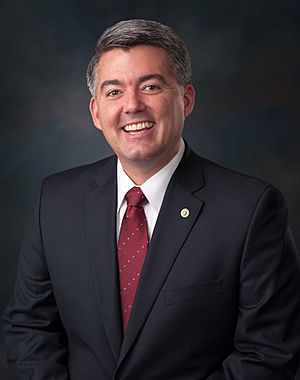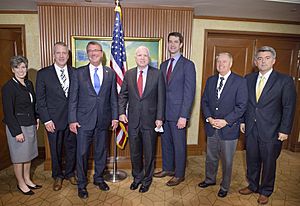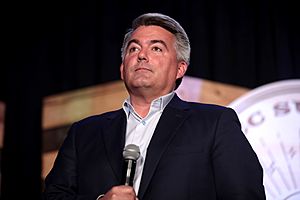Cory Gardner facts for kids
Quick facts for kids
Cory Gardner
|
|
|---|---|

Official portrait, 2015
|
|
| United States Senator from Colorado |
|
| In office January 3, 2015 – January 3, 2021 |
|
| Preceded by | Mark Udall |
| Succeeded by | John Hickenlooper |
| Chair of the National Republican Senatorial Committee | |
| In office January 3, 2017 – January 3, 2019 |
|
| Leader | Mitch McConnell |
| Preceded by | Roger Wicker |
| Succeeded by | Todd Young |
| Member of the U.S. House of Representatives from Colorado's 4th district |
|
| In office January 3, 2011 – January 3, 2015 |
|
| Preceded by | Betsy Markey |
| Succeeded by | Ken Buck |
| Member of the Colorado House of Representatives from the 63rd district |
|
| In office June 23, 2005 – January 2, 2011 |
|
| Preceded by | Greg Brophy |
| Succeeded by | Jon Becker |
| Personal details | |
| Born |
Cory Scott Gardner
August 22, 1974 Yuma, Colorado, U.S. |
| Political party | Republican |
| Spouse | Jaime Gardner |
| Children | 3 |
| Education | Colorado State University (BA) University of Colorado Boulder (JD) |
| Signature | |
Cory Scott Gardner (born August 22, 1974) is an American lawyer and politician. He served as a U.S. Senator for Colorado from 2015 to 2021. Before that, he was a U.S. Representative for Colorado's 4th district from 2011 to 2015. He also served in the Colorado House of Representatives from 2005 to 2011. Cory Gardner is a member of the Republican Party. As of 2025, he is the last Republican to have served Colorado in the U.S. Senate.
Gardner won a close election against the Democratic Senator Mark Udall in 2014. From 2017 to 2019, he led the National Republican Senatorial Committee, which helps elect Republican senators. He ran for re-election in 2020 but lost to former Governor John Hickenlooper. Since leaving the Senate, Gardner has continued to be involved in politics and policy.
Contents
Early Life and Education
Cory Gardner was born on August 22, 1974, in Yuma, Colorado. His parents are Cindy L. and John W. Gardner. He has Irish, German, Austrian, and English family roots.
College and Law School
In 1997, Gardner graduated with high honors from Colorado State University. He earned a degree in political science. While in college, he changed his political party from Democratic to Republican. He also worked as an intern at the Colorado State Capitol. Later, he attended the University of Colorado School of Law and earned his law degree in 2001.
Early Career in Politics
Before becoming a public official, Gardner worked for his family's business. He also served as a spokesperson for the National Corn Growers Association. From 2002 to 2005, he worked for former U.S. Senator Wayne Allard of Colorado. He was Senator Allard's general counsel and legislative director.
Serving in the Colorado House of Representatives (2005-2011)
Cory Gardner was first appointed to the Colorado House of Representatives in 2005. He was then elected to a full term in 2006. He represented District 63 in the Colorado House from 2005 until 2011.
Key Actions in the State House
In 2006, Gardner suggested creating a "rainy-day fund" for Colorado. This fund would help the state during tough economic times. He was against any tax increases. He also helped create the Colorado Clean Energy Development Authority. This group helped fund projects related to clean energy.
Serving in the U.S. House of Representatives (2011-2015)
Cory Gardner served as a U.S. Representative for Colorado's 4th congressional district.
Winning Elections for the House
2010 Election
In 2010, Gardner won the Republican primary election. He then ran against the Democratic representative, Betsy Markey. Gardner won the election on November 2, 2010, with 52% of the votes.
2012 Election
Gardner ran for re-election in 2012 and won easily. He defeated his Democratic opponent, Brandon Shaffer, with 59% of the votes. This election was helped by new district boundaries.
Serving in the U.S. Senate (2015-2021)
Cory Gardner became a U.S. Senator for Colorado in 2015.
Senate Elections
2014 Election
In 2014, Gardner was the Republican candidate for the Senate. He won a close race against the sitting Senator, Mark Udall. Gardner received 48% of the votes, while Udall received 46%.
2020 Election
Gardner ran for re-election in 2020. During his time as a Senator, he did not hold many public town halls. This led to a protest campaign featuring a "Cardboard Cory" cutout. This cutout appeared at protests and events across Colorado. Gardner lost the election to former Governor John Hickenlooper.
Senate Committees and Groups
As a U.S. Senator, Cory Gardner was part of several important committees. These committees work on different areas of government.
Committee Assignments
- Committee on Commerce, Science, and Transportation: This committee deals with things like aviation, technology, and consumer safety.
- Committee on Energy and Natural Resources: This committee focuses on energy, public lands, and water. Gardner was the chairman of the Subcommittee on Energy.
- Committee on Foreign Relations: This committee handles issues with other countries. Gardner was the chairman of the Subcommittee on East Asia, The Pacific and International Cybersecurity Policy.

After the Senate
After leaving the Senate in 2021, Cory Gardner has remained active. He was considered for other political roles, like governor of Colorado, but chose not to run. In February 2021, he became the chair of a group that raises money for Republican candidates. He also joined the board of advisors for a lobbying firm. In April 2022, he became the chief political affairs strategist for the Crypto Council for Innovation. In 2023, he helped lead a group supporting Senator Tim Scott's run for president.
Political Views
Cory Gardner is known for being a generally conservative politician. However, he has also worked with politicians from other parties. He was ranked as one of the most bipartisan senators in both the 115th and 116th Congresses. This means he often worked with Democrats on bills.
Views on Donald Trump
In the 2016 presidential election, Gardner first supported Donald Trump. However, after some controversial comments by Trump, Gardner said he would not vote for him. He called Trump's actions "unbecoming of the Presidency." But in the 2020 presidential election, Gardner again supported Trump. He voted with Trump on most issues during Trump's time as president.
Gardner sometimes disagreed with Trump on specific issues. For example, he criticized Trump's response to a white supremacist rally in 2017. He also expressed concerns about Trump's tariffs (taxes on imported goods), saying they could harm the American economy.
Views on the Economy
Gardner supports policies that aim to protect taxpayers. He has supported efforts to audit the United States Federal Reserve, which is the central bank of the U.S. He also introduced legislation to improve the Earned Income Tax Credit program, which helps working families.
Views on Education
In 2019, Gardner supported a bill to help employees pay off their student loans. This bill would allow employers to contribute money towards their employees' student debt.
Views on Energy and the Environment
Gardner acknowledges that climate change exists. However, he has often voted against measures to reduce greenhouse gas emissions. He has received donations from the oil and gas industry. Gardner supports building the Keystone Pipeline and is in favor of fracking.
In 2020, Gardner introduced the bipartisan Great American Outdoors Act. This law provides permanent funding for national parks and public lands.
Views on Foreign Policy
Gardner has been involved in foreign policy discussions. He signed letters urging strong action against Russia's airstrikes in Syria. He also supported the Israel Anti-Boycott Act, which made it a federal crime to encourage boycotts against Israel. He has expressed concerns about North Korea and supported efforts to prevent the U.S. from leaving NATO.
Views on Gun Policy
Gardner has stated that he opposes gun control. He believes that actions to prevent gun violence should not go against constitutional protections. He has voted against measures that would ban gun sales to people on terrorist watch lists or require background checks for all gun sales.
Views on Health Care
Gardner opposes the Patient Protection and Affordable Care Act (ACA), also known as Obamacare. He has voted to repeal it. He was part of a group of Republican senators who worked on a plan to replace the ACA. He also supported a bill that would protect healthcare providers who refuse to offer services based on their religious or moral beliefs.
Views on Immigration
Gardner is generally seen as moderate on immigration policy. He supports increased border security and a guest worker program. In 2014, he voted against a bill that would have ended the Deferred Action for Childhood Arrivals (DACA) program. He criticized a 2017 executive order that banned travel from several Muslim-majority countries, saying it went "too far."
In 2018, Gardner was one of several Republican senators who asked for a pause on the policy of separating families at the border. However, in 2019, he voted to support President Trump's national emergency declaration to build a wall on the southern border.
Views on Internet and Technology
Gardner opposes net neutrality regulations. He voted against a bill that would have brought back net neutrality rules. In 2017, he voted for a proposal that allowed internet service providers to sell customers' browsing history without their permission.
Views on LGBTQ Policy
Gardner has stated that he opposes same-sex marriage. However, after the U.S. Supreme Court ruled in 2015 that same-sex marriage was a constitutional right, he said that the courts' decisions must be honored. In 2007, as a state representative, he voted against allowing gay and lesbian couples to adopt children in Colorado.
Views on the Judiciary
After the death of Supreme Court Justice Ruth Bader Ginsburg in September 2020, Gardner said he would vote to confirm a "qualified" nominee. In 2016, after the death of Justice Antonin Scalia, Gardner had said the Senate should wait to confirm justices close to a presidential election.
Views on Mental Health
..... This law created a new three-digit phone number (988) for a suicide prevention hotline. The bill also helps fund services for high-risk groups, including LGBTQ youth and people in rural areas. The bill became law in October 2020.
Images for kids
See also
 In Spanish: Cory Gardner para niños
In Spanish: Cory Gardner para niños
 | Aaron Henry |
 | T. R. M. Howard |
 | Jesse Jackson |







